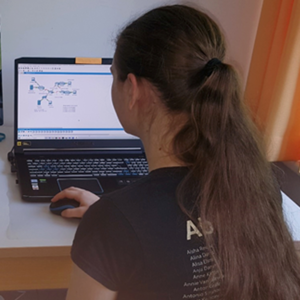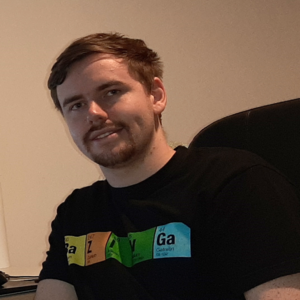Building up application-ready knowledge of communication networks online - how does that work? A summary at the end of the "Corona semester".

According to the module description, the class / course should enable students to plan, set up, connect and operate small communication networks and to troubleshoot and rectify any errors that occur.
Prof. Dietmar Scharf teaches these skills using the configuration of network devices from one of the world's leading network equipment manufacturers. On the one hand, these devices can be found in the vast majority of companies. On the other hand, countless documents, forum posts and videos can be found on the Internet on the topics covered, making supplementary self-study easier.
Will this also work in online teaching?
The lecture was held online at the times scheduled in the timetable, supplemented by exercises that could be completed at the students' own pace, time and scope with the help of the "Packet Tracer" simulation software. The main purpose of these exercises with the simulation software is to illustrate the dynamic behavior of a network with all its errors using a simulation - instead of a practical laboratory course.
In addition to general online support from the lecturer, e.g. answering questions and correcting submitted solutions, several tutorials were held on a smaller scale. These online events were conducted by the laboratory engineer Mr. Egmont Schreiter. The focus was on topics that were of particular interest to the students.
So much for the theory, but what do the students say about it, did they acquire the desired skills at the end?
We spoke to Emily Unverricht ( automation and mechatronics degree course) and Dominik Samtleben ( electrical power systems degree course) about this. Both are completing the dual study program KIA. With the support of their company, they have already obtained their first vocational qualification as electronics technicians and have just completed the "Communication Networks" module in their 6th semester.
Emily Unverricht: A lot of communication took place via social networks even before the coronavirus crisis. For example, we have a WhatsApp group with all the students in our year's faculty, which was created in the first semester. I would also recommend this to new freshmen. Virtual meetings can also be held using conference software.
Dominik Samtleben: The dates for the events were sent to us by the professors by email, so you always had a good overview of your appointments on any given day. Further communication with the professors was also mostly by email. As the professors usually replied quickly, there were no problems. For urgent matters, you could also contact the professors by phone. If you have any problems, you can also contact the Faculty Student Committee for Electrical Engineering, which is always there to help and advise students. Communication with fellow students is also very important during this time, e.g. so that you don't miss deadlines for submitting documents. A small meeting in the canteen or a study group in a virtual classroom is recommended.
Emily Unverricht: The main element that gives structure to the daily routine is the online lectures. I get up and attend the lectures according to the lecture times. I structure the rest of my time with a to-do list. It contains all the tasks and the times at which they have to be completed. Apart from that, my day is not particularly structured. I complete tasks when I have the time and leisure to do so. However, I make sure I do everything as soon as possible so that I don't accumulate a mountain of work. As I'm a person who prefers to work alone, this semester has played into my hands. I've been very productive in a relaxed way.
I go to the canteen for lunch during the week. Despite the limited choice, there's almost always something for me. I prepare the other meals myself at home or with my flatmates.
Dominik Samtleben: For me, there were no major changes within my daily routine, as all lectures took place as planned. Ultimately, I can draw a good conclusion: some tasks are easier to manage in an online lecture than in an in-person semester. Even if it's not always easy to be tied to the screen for several hours. However, an online lecture is an advantage, especially if you are working with simulation software. You can also meet up with your fellow students online and experience has shown that these meetings are much more productive than in the classroom.

I was very productive in a relaxed way. Emily Unverricht
”Emily Unverricht: The simulations were very instructive for me. They allowed me to put the theoretical material from the lecture into practice immediately afterwards and thus deepen my knowledge. The simulation tasks can also be kept as voluntary exercises for future semesters. Nevertheless, I would have liked to see a laboratory practical course to get to know hardware-specific features. The lab practical should focus on setting up the physical network and less on programming it. This was discussed in the online seminar with Mr. Schreiter, but in my opinion it is easier to learn if you do something yourself.
Dominik Samtleben: Well, the lab practicals have been dropped, but we had the online seminar in which the components and connector types were presented and demonstrated to us. Otherwise, there is hardly any difference between carrying out the experiments in the lab and simulating them on my computer. We always carried out the simulation as a group. We met in an available virtual classroom and if there were any complications, we shared the screen and looked for the errors together.
Emily Unverricht: I would like to take this opportunity to say that the "Communication Networks" class / course is one of the best-implemented online courses I have been able to attend this semester. I would particularly like to emphasize the opportunities for in-depth study through the control questions and the simulations with PacketTracer, as well as the opportunity to participate in Cisco NetAcad courses.
Dominik Samtleben: The simulation task with Packet Tracer and the control questions that are part of the lecture should be mentioned positively. The entire module is very good for online teaching and is also very student-friendly.

In the end, I can draw a good conclusion, some tasks can be better organized in an online lecture than in a face-to-face semester. Dominik Samtleben
”